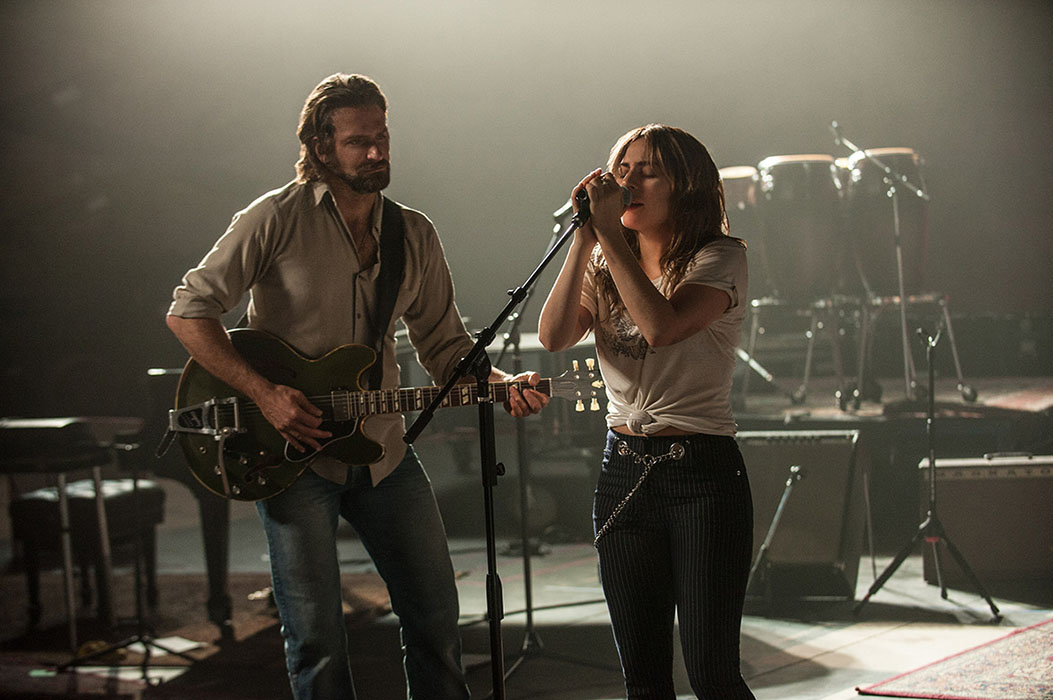“Music is essentially twelve notes between any octave. Twelve notes and then the octave repeats. It’s the same story, told over and over. All the artist can offer the world is how they see those twelve notes,” muses Bobby Maine (Sam Elliott) in the final act of A Star is Born (2018). While it’s easy to get lost in Elliott’s poetic, deep voice, this line of dialogue captures the heart of Bradley Cooper’s 2018 remake of the 1937 classic—remade with even more beauty in 1954 with Judy Garland, and one more time in 1976 with Barbra Streisand. Cooper, as star, director, and writer, anticipates the question on the lips of any critic challenging just how personal his film is: Why, for his first film as director, would he choose to helm a remake of a classic? The answer seems to be that it’s only through the confines of a remake that Cooper can truly tell the story he needs to tell. Only through the same twelve notes given to the other films, can he make something truly his own.
A Star is Born follows Jackson Maine (Cooper), an alcoholic and declining rock star, as he falls in love with Ally (Lady Gaga) and helps elevate her to total pop stardom. When we meet Ally, she’s working as a waitress and singing during late shows at a drag bar. Jackson stumbles into her bar, in dire need of a drink, just in time to see her take the stage and perform La Vie en Rose. Through his alcoholic haze, Jackson sees beyond her stage persona and experiences love, or at least infatuation, at first sight.
So much of the joy of A Star is Born is in the falling-in-love phase of the relationship, so I’ll be careful to not spoil much more; what follows that first encounter, however, is the wonderful progression of two people smitten with each other continuing down their loving path. The main trick of the movie is that it makes you believe that these two people who go through monumental life changes are doing just fine because they’re in love. For the first half of the movie, I forgot about conflict and issues and was able instead to observe a deeply personal romance. I forgot the red flags, or at least I could overlook them because it felt brutally honest and romantic to hear Jackson Maine tell Ally that his home never felt like a home until she was there. But Jackson doesn’t stop drinking, and Ally doesn’t stop gaining stardom.
The arc of the story eventually extends the true love angle to much darker places, just like its predecessors. A Star Is Born is no simple date night movie—the second half is at times harder to watch than some horror movies.
Cooper, as director, handles the telling of the story elegantly. The heir-apparent to Cameron Crowe, Cooper doesn’t shoot his movie in a prestige (or Oscar-hungry) style. He instead employs a lot of close-ups, illustrating his fascination both with his own face and Lady Gaga’s. While it’s a strange directorial choice to shoot yourself almost entirely in close-up, it’s the right choice here. Within the style of the cinematography is a drunkenness of colors and grain. It’s all that Jackson cares about: experiencing a richness of life, while numbing it with his incessant drinking, and that is reflected in Cooper’s carefully crafted style of the film.

Even with an incredible performance by Gaga, the true star here is Cooper, the actor. With a voice a few octaves below his typical register and a smoothness to give even the great Sam Elliott a run for his money, Cooper’s Jackson Maine is always charming, sometimes infuriating, and often tragic. It’s clear that Cooper poured much of himself into this movie, yet that still doesn’t answer why he chose this retelling over other stories.
In 2015, Cooper, a three-time Academy Award nominated actor, opened up about his years of addiction, the dark places it took him, and how sobriety positively affected his life and career. Through that lens, A Star Is Born almost seems to be a reckoning of his past. Perhaps it is a trauma-driven relapse into an aspect of his previous life. Everyone always asks “what if” questions but rarely do those same people get to live out their personal “what if.” Here, Cooper can delve back into his most personal “what if,” and he can do it with the accountability of his own now-sober eyes.
A Star Is Born is a painful movie, one that goes into depths where those with addiction don’t want to go and those who love someone with an addiction don’t want to go. It is however, an honest and highly artistic movie that deeply loves its characters with the desperate and purposeful distance that only someone who has loved someone with an addiction can muster.
The writing takes a few missteps in the second half. Ally’s music gets much, much worse as she gets more famous, which is an unnecessary complication to a rich character. Similarly, the romance tapers off a little too steeply as well, which is not an attribute of the incredible Judy Garland version. Regardless of the few problems I have, Cooper, with the help of fantastic performances from Gaga and Elliott, delivers an empathetic debut that finds its home among the best versions of the story, surpassed only by the 1954 Garland version.
A Star Is Born is not just a retelling of a classic, it is a deeply intimate study of these new characters. According to Cooper himself, the early Oscar-buzz surrounding his debut film is purely incidental; A Star Is Born was never meant to be anything more than a small, personal film whose story he needed to tell. He took the 12 notes played by the previous three films and played them in a refreshing tune, adding his own essential voice to the mix.
Knoxville Showtimes








